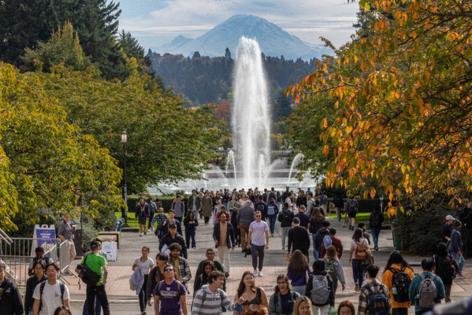Chinese students at Washington schools face uncertainty after visa announcement
Published in News & Features
Chinese students studying at Washington state colleges and universities could face an uncertain future following this week’s announcement that the U.S. will start revoking some of their visas.
The U.S. State Department will work with the Department of Homeland Security to “aggressively revoke” visas for Chinese students, including those with Chinese Communist Party connections or those who are “studying in critical fields,” Secretary of State Marco Rubio said Wednesday in a statement. The statement said the State Department will also revise criteria for visa applications from China and Hong Kong in the future.
The State Department did not specify the scope of the visa revocations, when they would take effect or which “critical fields” would be targeted.
Visa revocations for Chinese students could have a significant effect at schools like the University of Washington, where nearly 8% of all students enrolled are international students from China, with an even larger proportion among graduate programs. One out of every 10 UW graduate or professional students is Chinese.
UW isn’t aware of which criteria or legal justification would be used for visa revocations, UW spokesperson Victor Balta said Thursday. The university is monitoring the situation, and international student services offices will speak directly with potentially affected students.
Washington State University has 140 international students from China, most at the graduate level. Seattle University has 80 students from China, and the school is supporting them, along with all of its international students, university spokesperson Mike Allende said. At Green River College, a community college in Auburn, 88 students from China are enrolled. The college hasn't received any notification of changes affecting its students.
We remain committed to supporting all of our international students and ensuring they have the resources they need to be successful during their time at the college, spokesperson Philip Denman said.
Many Washington schools, and schools nationwide, have long welcomed international students to their campuses. They pay more in tuition compared to in-state or nonresident students, effectively subsidizing other students. In Washington state, 23,878 international students studying at colleges and universities contributed $918 million to the U.S. economy during the 2023-2024 academic year, according to the nonprofit NAFSA: Association of International Educators.
At UW, China represents the greatest proportion of international students, followed by India and Taiwan.
On Thursday, one undergraduate international student from China said she wasn’t aware of Rubio’s remarks. But she’s started taking precautions since the high-profile revocation of visas at UW and other campuses around the country.
In April, at least 35 students and recent graduates at seven Washington universities, along with thousands of others across the U.S., had their visas revoked, leading to fears of being deported. Students filed lawsuits in response, and some began seeing their legal statuses reinstated. Last week, a California judge blocked the Trump administration from revoking the legal status of international students while a case moves through the court system.
Everywhere the undergraduate international student goes, she carries with her the papers that prove she can be here. She pulled them out of her backpack during an interview in Red Square, the brick-lined thoroughfare at the center of the UW Seattle campus. Her student visa, passport and other documents were neatly tucked into a blue, translucent folder.
“It just adds a lot of stress,” the student said, requesting to remain anonymous out of fear that her legal status could be targeted.
She has decided not to return home to northern China this summer, worried she might not be allowed back into the U.S. Stories of students being detained or denied reentry circulate regularly on RedNote, a Chinese social media app, she said.
“I was sad. I miss the food there,” she said.
Still, she remains focused. After she graduates with a degree in informatics, one of the university’s most sought-after programs, she hopes to work in UX design or another tech role. She’s drawing plans for how to stay in the country legally after graduation. A master’s program is one option she’s considering if other paths close.
Despite the uncertainty, she says she’s integrated well at UW. Her professors have been supportive, and a teaching assistant pointed her toward legal advising services for immigrant students. She has an American boyfriend and a close circle of friends.
For all of her time here, she said, she’s felt welcomed.
©2025 The Seattle Times. Visit seattletimes.com. Distributed by Tribune Content Agency, LLC.







Comments